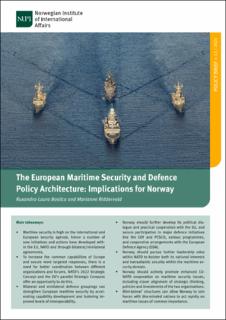The European Maritime Security and Defence Policy Architecture: Implications for Norway
Research report
Published version
Permanent lenke
https://hdl.handle.net/11250/3030872Utgivelsesdato
2021Metadata
Vis full innførselSamlinger
Sammendrag
Maritime security is high on the international and European security agenda, hence a number of new initiatives and actions have developed within the EU, NATO and through bilateral/minilateral agreements. To increase the common capabilities of Europe and secure more targeted responses, there is a need for better coordination between different organizations and forums. NATO’s 2022 Strategic Concept and the EU’s parallel Strategic Compass offer an opportunity to do this. Bilateral and minilateral defence groupings can strengthen European maritime security by accelerating capability development and fostering improved levels of interoperability. Norway should further develop its political dialogue and practical cooperation with the EU, and secure participation in major defence initiatives like the EDF and PESCO, various programmes, and cooperative arrangements with the European Defence Agency (EDA). Norway should pursue further leadership roles within NATO to bolster both its national interests and transatlantic security within the maritime security domain. Norway should actively promote enhanced EUNATO cooperation on maritime security issues, including closer alignment of strategic thinking, policies and investments of the two organisations. Mini-lateral’ structures can allow Norway to join forces with like-minded nations to act rapidly on maritime issues of common importance.
